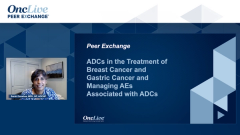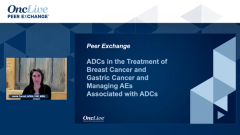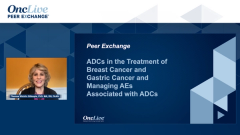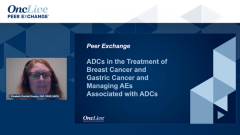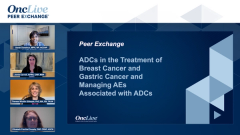
Novel Clinical Trials With ADCs in Gastric Cancer
Before closing out their discussion on HER2+ gastric cancer, experts review clinical trials investigating other novel ADC agents in this setting.
Episodes in this series

Transcript:
Sarah Donahue, MPH, NP, AOCNP: What are some other antibody-drug conjugates [ADCs] being evaluated in patients with metastatic gastric cancer right now that we haven’t already discussed?
Elizabeth Prechtel Dunphy, DNP, CRNP, AOCN: There are 2 studies I’d like to mention. One is a phase 3 trial of … phenytoin, which is a HER2-targeting ADC comprised of a novel humanized anti-HER2 IgG1 [immunoglobulin G1] antibody and a microtubule inhibitor, MMAE, which is a monoclonal antibody of monomethyl auristatin E, conjugate. That’s being looked at in the metastatic setting. It’s a phase 3 study, randomized open-label, parallel-controlled study evaluating the efficacy of the recombinant humanized anti-HER2 monoclonal antibody, the MMAE conjugate, for patients who have HER2 overexpression. The overexpression for this study is defined as plus 2 or 3 score on IHC [immunohistochemistry] regardless of FISH [fluorescence in situ hybridization] status. There are 2 arms, which I found interesting.
One arm is with the RC48-ADC every 2 weeks IV [intravenous] vs physician choice. The physician choice was paclitaxel, irinotecan, and apatinib mesylate, or Aitan. I found that interesting because I wasn’t familiar with that being used here in the United States. So I did some investigating, and that is a multitargeted tyrosine kinase inhibitor that inhibits VEGF2. It’s approved in China for late-stage gastric carcinoma and has been in their armamentarium of treatments since 2004. The outcome is being looked at in this particular study as in other studies. The primary end point will be overall survival, progression free-survival, objective remission rate, duration of relief, and time to tumor progression. Patients had to have had progression or intolerance following at least 2 systemic therapies. And as I mentioned, the HER2-positive by IHC is 2+ or 3+.
There’s a second study that’s a phase 1 study that’s looking at ARX788, which I think you mentioned in breast cancer, a humanized anti-HER2 antibody, Amberstatin 269. This is a 2-part phase 1 study in which the ARX788 is given by infusion, and patients had to have received a prior treatment with trastuzumab.
Patients have to be FISH positive or IHC plus-3 HER2 positive, and it’s a dose-finding study. ARX788 is a next-generation, site-specific anti-HER2 ADC that utilizes non-natural amino-acid-enabled conjugation technology and a noncleavable Amberstatin drug linker to generate a homogenous ADC with a drug-to-antibody ratio of 1 to 9. It has a growth inhibitory effect on all 5 lines of HER2-positive cells that were tested. I wanted to investigate it a little further because I wasn’t certain myself what ARX788 was. So that’s my information that was gathered.
Transcript edited for clarity.


